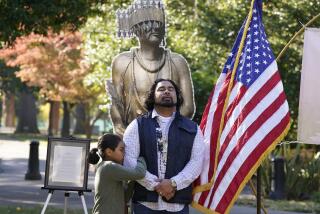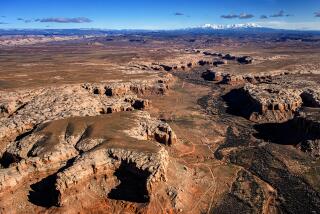Family’s Suit Draws Bead on Texas Land
- Share via
SARITA, Texas — The history books tell how, nearly 150 years ago, Richard King and Capt. Mifflin Kenedy braved an untamed land and conquered vicious Mexican bandits to become Texas legends.
They were warriors, industrialists, leaders, gentlemen. Their legacy is alive today in a sprawling tract of South Texas ranchland, where cattle still roam and oil and gas companies hunt for precious minerals.
But history is written by the victors. The vanquished tell a different story. They say King and Kenedy were greedy thieves who used trickery and even violence to steal land from Mexican ranchers, leaving them with no recourse in a province ruled by racism and wealth.
Now the descendants of those ranchers are going to court to regain their ancestors’ land and rewrite history.
“The land still belongs to us,” said Jose Perez. “We would like to see justice done, to have the wrongs that were done righted.”
Perez, 62, is a great-great-grandson of Mexican rancher Jose Manuel Balli Villarreal Balli, once owner of a great slice of land just north of the Rio Grande. He is also president of Los Ballis Restoration LLC, a partnership of Balli descendants established in 1995 to pursue the family’s claim.
They allege that Kenedy stole 370,000 acres from their ancestor after the Mexican War, and they want it back, along with the rights to its profitable oil and gas leases.
If they succeed, it could change history forever--and lead to a slew of lawsuits over Texas land that some claim never belonged to Texans.
“It’ll create a precedent. It’s extremely important from that perspective,” said Don Carleton, director of the Center for American History at the University of Texas.
The Balli descendants claim their ancestor acquired the land in the early 1800s, when South Texas was still part of the Spanish empire. When Kenedy arrived, Balli leased the land to him, believing his ownership rights were protected.
But Kenedy never had any intention of returning the land to its rightful owner, said Lynne Perez, a genealogist and historian hired by the Balli descendants.
“Mifflin Kenedy came to Texas with the goal of building an empire. He would lease the lands from people and then fence it. By keeping them out, it was his,” said Lynne Perez, whose husband is Jose Perez’s nephew.
If Kenedy couldn’t lease the land, he and his friend and partner, King--creator of the great King Ranch, which is adjacent to the Kenedy holdings--would employ other means to get what he wanted, the genealogist said.
“People who opposed Kenedy and King were killed. The Mexican-American population was in terror of these people,” she said.
Carleton agreed that it was not unusual for early Texas settlers to use trickery or even force to take land from Mexicans after the war.
“They did use intimidation and violence, just like Native Americans were removed with the end of a gun barrel from lands they were inhabiting,” he said. “With certainty, we do know that groups of people were dispossessed of their land, illegally as well as legally.”
The Balli family has been trying to reclaim the land since the late 1800s. It was thwarted first by a court system controlled by the Kenedys and Kings and, later, by a lack of organization among scattered descendants, Lynne Perez said.
Now, more than 800 descendants have gone to court to obtain declarations that they are Balli’s legal heirs. That’s the first step toward reclaiming the land, said Eileen Fowler, an attorney who represents 586 descendants.
“What they really want is the mineral rights, their inheritance rights,” said Fowler, who estimates those profits, past and present, range from millions to billions of dollars.
The John G. and Marie Stella Kenedy Memorial Foundation filed a court petition in April seeking to bar the Ballis from making a legal claim to the land. The foundation, established in 1960 by Kenedy’s granddaughter to oversee the land and its interests, also is seeking a legal declaration of ownership.
The petition states the foundation is the rightful owner both by deed and adverse possession, the legal principle that conveys ownership to people who occupy and improve abandoned land. No hearing date has been set.
Foundation attorney Richard Leshin promised to “vigorously pursue” that position in court. He declined further comment.
But the Balli descendants contend they have documents dating to the 1800s that prove Balli owned the land. Among them is a 50-year grazing lease, signed in 1949 by Kenedy’s granddaughter and several Balli descendants, that acknowledged Balli as the owner.
Jose Perez said he hoped his family’s action would encourage similar efforts, because it’s time that history is rewritten.
“Before the Mexican War, the Spanish culture prevailed and people were very, very affluent. After the war, they all lost everything,” he said. “There are a lot of families in this situation. I hope this does inspire them to organize, so that justice will prevail.”
More to Read
Sign up for Essential California
The most important California stories and recommendations in your inbox every morning.
You may occasionally receive promotional content from the Los Angeles Times.













